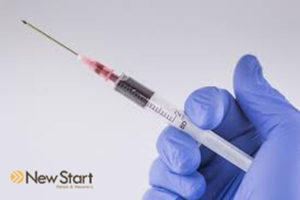 Like the classic domino effect, drug use leads to addiction, which leads to sharing needles, which leads to the spread of infections. An addict who shares needles not only has to deal with their addiction, but is also at a high risk of contracting infections. HIV and Hepatitis C are common infections that can be spread by sharing needles. Needle exchange programs combat the spread of these bloodborne diseases.
Like the classic domino effect, drug use leads to addiction, which leads to sharing needles, which leads to the spread of infections. An addict who shares needles not only has to deal with their addiction, but is also at a high risk of contracting infections. HIV and Hepatitis C are common infections that can be spread by sharing needles. Needle exchange programs combat the spread of these bloodborne diseases.
Approximately 10% of AIDS cases in the U.S. were attributed to injection drug use in 2015 alone.
So What Exactly Are Needle Exchange Programs?
Needle exchange programs are social services that offer clean hypodermic needles to injection drug users at no cost. Those who participate in the program bring their used needles back in exchange for new needles. Hence the name “needle exchange.”
The program is driven by the theory of harm reduction. Harm reduction assumes that most addicts cannot change their unhealthy habits and that those who can don’t want to. So it offers a way for users to at least have access to less dangerous options when participating in harmful activities. In this case, needle exchange programs don’t try to stop drug use but instead attempt to decrease the risk of infection during drug use by offering clean needles.
Despite their role in lowering the prevalence of harmful infections, needle exchange programs have received some backlash from the public. Many people don’t agree with the harm reduction theory. So they fault needle exchange programs for adding to the rising rates of drug use. However, an addict who reuses needles can benefit from a program that offers clean alternatives regardless of his addiction. The addiction may still be an urgent issue and is definitely not something to brush aside. But it at least wouldn’t be accompanied by another harmful disease like AIDS or hepatitis.
Major Pros and Cons
Pros:
- Needle exchange programs reduce the risk of sharing contaminated needles by offering clean needles and disposing of used needles.
- Most programs offer free HIV testing and counseling services for individuals who have participated in harmful activities.
Cons:
- Needle exchange programs may increase rates of drug use by giving injection drug users more needle options.
- Needle exchange programs only attempt to lessen the risk of harm during drug use rather than stopping drug use completely. So, people view these programs as accepting/enabling drug use.
Drug addiction is serious and can lead to other harmful illnesses and infections. It’s important to seek help as soon as possible. Call us at 855-737-7363 if you or someone you know is struggling with addiction and needs help. And if you do end up sharing needles, check out this blog to learn what you should do afterwards.

